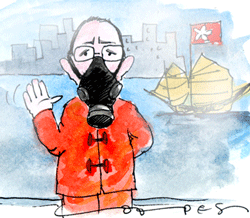Vulture fund litigation ... Issue of Hong Kong's jurisdiction over the Congo (Democratic Republic of) ... Expensive counsel fly in from the UK ... Mountains of cash, Chinese politics and judicial independence of Hong Kong all in play ... Percy Lo-Kit Chan reports It reads like an international thriller - yet the underlying story raises vital issues concerning the rule of law in Hong Kong, and its relations with our "mother country".
It reads like an international thriller - yet the underlying story raises vital issues concerning the rule of law in Hong Kong, and its relations with our "mother country".
In brief, a "vulture" fund (which specialises in buying distressed debt at a deep discount to its face value) acquired an aged and apparently irrecoverable obligation entered by the Democratic Republic of the Congo - think Heart of Darkness meets Hard Times.
The vulture, of course, wishes to collect and discovers an "asset" in the shape of moneys owed to the Congo by a PRC entity, apparently recoverable in Hong Kong.
Can it swoop in upon this juicy piece of carrion and enforce in Hong Kong?
The matter gets interesting and complicated (at least for your correspondent).
The British legal system, which we maintain here as part of our unique comparative advantage over the more byzantine and politically influenced system to our immediate north, recognises a doctrine of "limited sovereign" immunity.
That is to say, according to the Trendtex decision as handed down to us by the common law, if a sovereign entity (like the Congolese government) engages in "trade" and "commercial activity" then those aspects of its business lose the general protection that attaches to its otherwise universal protection as a sovereign state.
In the usual case, the overriding doctrine of comity would mean that the Hong Kong court would not presume to permit the Congo to be impleaded here in the courts of Hong Kong, nor could China be impleaded in the courts of the Congo. You scratch my back and I will scratch yours!
It seems clear that the activities of the Congo involve "trade" and therefore are not immune. But (and it is very large but) perhaps unsurprisingly, the People's Republic of China does indeed recognise a doctrine of "universal" immunity - that is to say, on no account whatsoever may the Congo be impleaded.
Here lies the rub - the PRC, naturally, is in charge of all our international affairs. The Hong Kong Special Administrative Region does not have any "foreign" affairs role at all - that is why, I sleep soundly in my bed every night. I do not worry about someone "attacking" Hong Kong from anywhere because the People's Liberation Army (and navy and airforce) are ever vigilant to ward off incursions.
Surprisingly, although they are no doubt present in some numbers in Hong Kong, one never sees PLA officers, and soldiers, in the streets of Hong Kong, which is a very pleasant contrast to watching brawling members of the Black Watch at Stanley Beach on a Sunday, under the Empire.
So, does the exercise of a jurisdiction over the Congo attract "blanket immunity" - and thus a more than usually hungry vulture - or limited immunity, in which case champagne and caviar at the Mandarin Grill?
The trial judge thought it was a matter for the general PRC law (full immunity), the Court of Appeal disagreed. What will the Final Court of Appeal (on which Mason NPJ will no doubt be playing a leading role) decide?
The matter has a large political element since it is possible for a case to go from the Hong Kong Court of Final Appeal to the National People's Congress - a political body and part of the PRC system of governance.
Naturally, the Court of Final Appeal does not like matters going to the NPC, for the obvious reason that it is not a court of law and hearkens back to the British system under the late Tudors.
In recent memory, only the decision on the "right of permanent abode" for mainland citizens in Hong Kong has gone from the Court of Final Appeal to the NPC where the court's decision was reversed.
Since this involved important matters of internal migration and a mixture of politico-legal issues, the reference was entirely understandable in one sense.
A caravanserai of great and good counsel (experts in public international law all) flew in, at some expense, from the United Kingdom to argue the case.
What will the court decide? We have a new Chief Justice and an experienced tribunal. The ultimate decision will call for all its combined legal and political savvy to steer a safe course in rocky waters that involve a poultice of cash, the political interests of the Chinese state at the highest level, and the continuing judicial independence of Hong Kong.
Percy